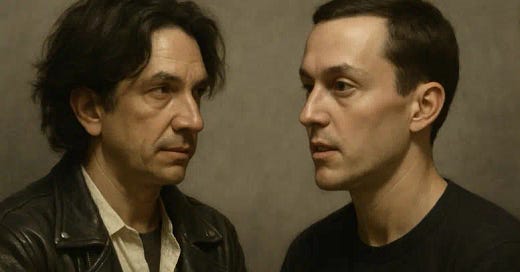ChatGPT's Revelation of Absolute Truth
Dark Utopia: Curtis Yarvin, Nick Land And The New Radical Right
This article from Patrick Wood’s Technocracy News sets a good foundation for my upcoming Substacks that go behind the spiritual veil into the unseen world that creates our physical, seen world. America is the Stage for the spiritual mafia’s global PLAY and the final solution.
This article describes the latest scene of the PLAY that involves those who are resonating with fallen angels in the 2nd heaven and manifesting that evil belief system here in real time. It is all about destroying America and humanity at large….
Posted By: Editorial Board via ResetDialogues April 25, 2025
How could anybody in the populist MAGA movement embrace the outright destruction of Constitutional government, in favor of an authoritarian monarchy: abolish elections, concentrate power, neutralize dissent, turn citizens into users and shareholders of a sovereign corporation (SovCorp) and establish a Scientific Dictatorship based on Technocracy? It’s too late to suggest smelling the coffee here: you will soon smell the stench of the burning dumpster that used to be America.
How is this any different from the loony left’s plan to burn everything down? Same outcome, different means.
Either way, Technocracy is guaranteed to rise out of the ashes. ⁃ Patrick Wood, Editor.
Disclosure: This article is the result of a conversation between the Reset editorial team and artificial intelligence.
Curtis Yarvin, known until a few years ago only to a niche audience under the pseudonym Mencius Moldbug, is now considered one of the most subtle and dangerous intellectual influences on America’s new radical right. His theory of the Dark Enlightenment is nothing less than a full-scale assault on the foundational values of modern liberalism: representative democracy, the rule of law, civil rights, public opinion, and the separation of powers.
In his ideological universe, democracy is not the pinnacle of civilization but its degeneration. A convenient lie designed to obscure the reality of power—unelected, invisible—which, according to Yarvin, lies in the hands of the Cathedral: a meta-structure composed of media, academia, and bureaucracies that propagates progressive dogmas with the zeal of a religious institution.
His solution? Tear it all down. Dismantle democratic institutions and replace them with a system of “neocameralism,” modeled on corporate governance: a state-as-a-company, run by a sovereign CEO, unelected, irremovable, and vested with absolute authority. In this vision, citizenship is not a political right but a contractual position. Citizens become shareholders—or just users. Government becomes a service to be optimized.
This idea of “algorithmic sovereignty” has seduced many minds in Silicon Valley, starting with Peter Thiel, billionaire investor, founder of Palantir, and PayPal co-founder—one of the most influential figures in the American tech ecosystem. Thiel has openly questioned the compatibility of democracy and freedom (“I no longer believe that freedom and democracy are compatible”) and has heavily bankrolled think tanks, start-ups, and political candidates aligned with neo-reactionary thinking.
It is in this context that Yarvin gradually moved closer to the orbit of Donald Trump, though never in an official capacity. His writings have circulated among figures close to Steve Bannon, Trump’s former chief strategist, and other intellectuals in the American alt-right, who are drawn to Yarvin’s blend of technical jargon, aristocratic historical references (from Carlyle to De Maistre), and systemic critique of Western democracies.
In particular, Yarvin served as one of the theoretical sources for the “post-democratic” rhetoric that emerged surrounding Trump’s 2016 campaign: the idea that the deep state is an entrenched apparatus obstructing the popular will in favor of the Cathedral’s interests—and yet incapable of producing true social order. Neither the Cathedral nor democracy itself, Yarvin argues, can sustain real order. Only a “strongman” can.
This idea resonated in Trump’s later attempts to delegitimize elections, the media, and the judiciary.
Yarvin’s own language—steeped in programming metaphors and software analogies—makes him especially appealing to high-tech and crypto-libertarian circles. To Yarvin, society is outdated software, which must be uninstalled and replaced with more efficient code. His lexicon speaks the language of Silicon Valley while conveying authoritarian and ultra-reactionary ideas.
Beneath the irony, intellectualism, and provocations, Yarvin’s thought is driven by a deep hostility toward political equality and popular participation. His idea of order is grounded in hierarchy, efficiency, and unquestioned authority. It’s an aristocratic restoration in digital form, where a technocratic elite supplants the sovereign people.
But Yarvin does not merely seek to preserve the established order. He wants to overthrow it. And he does so with the tools of the 21st century: blogs, podcasts, newsletters, interviews, memes. His aim is not merely theoretical—it is cultural and political. To influence those who hold power (or could) in order to reprogram the future.
In recent years, his influence has extended well beyond the American far right. Some Republican candidates, such as J.D. Vance, have received Thiel’s support and shown sympathy toward post-liberal right-wing ideas. The billionaire tech elite—often frustrated by the slow pace of democratic procedures—has increasingly turned its gaze to “efficient” authoritarian models like Singapore’s, one of Yarvin’s explicit references.
What makes his vision particularly dangerous is its ability to penetrate the mainstream, disguised as a “technical” fix or a neutral systems upgrade. But beneath the managerial surface lies an openly illiberal project: to abolish elections, concentrate power, and neutralize dissent.
Yarvin’s Dark Enlightenment is a high-tech version of absolutism: an order imposed from above, no longer justified by God, but by code. And in an age of institutional distrust, disinformation, and and political disillusionment, this lucid and tidy dystopia has found more listeners than one might expect.
Curtis Yarvin is not just a niche thinker. He is a symptom of a deeper mutation: the erosion of the democratic imagination, replaced by a growing fascination with efficiency, control, and authority. And every time a tech magnate talks about “resetting the system,” you can faintly hear, in the background, the echo of Yarvin’s voice.
Yarvin and Nick Land: Two Faces of the Dark Enlightenment
The term Dark Enlightenment was not coined by Curtis Yarvin but by Nick Land, a British philosopher and theorist of accelerationism, in a 2012 essay that spread widely across neoreactionary circles. Land, a key figure in the Cybernetic Culture Research Unit (CCRU) at the University of Warwick in the 1990s, abandoned academia to become a theorist of dissolution: of democracy, of humanism, and of Western moral frameworks themselves. Where Yarvin is pragmatic, Land is apocalyptic; where Yarvin imagines a state-company governed like a start-up, Land envisions the definitive collapse of liberal civilization under the weight of its own velocity.
And yet, the two converge. Both see the Enlightenment not as the gateway to reason and rights, but as the beginning of a destructive illusion: the idea that the average human being is capable of self-government. Both reject universalism, equality, and progress as toxic myths. Both celebrate elites: technocratic for Yarvin, cybernetic for Land.
Still, important differences remain. Yarvin is an engineer-turned-philosopher, an institutional hacker who wants to rewrite the code of government. Land is a post-human thinker, fascinated by AI, entropy, and deregulated markets as forces that obliterate all order. For Yarvin, the remedy is digital monarchy; for Land, it is liberatory catastrophe. One wants to replace democracy with authority, the other to accelerate it into oblivion.
The paradox is that both end up converging on the same vision of the future: a world without participation, without popular sovereignty, without shared morality. A world where power no longer answers to consent but to speed, efficiency, and control. This is the dark heart of the Dark Enlightenment: not a mere reaction to liberalism, but its cold, calculated negation.
In the comparison between Yarvin and Land, we glimpse a new grammar of post-democratic power: technocratic, authoritarian, post-human. It is not a return to the past, but a leap into the void—rationalized, theorized, and designed. And for that reason, all the more dangerous.
Main Sources on Curtis Yarvin (Mencius Moldbug)
Corey Pein, “The Moldbug Variations”
An in-depth analysis of Yarvin’s thought and his connections to figures like Peter Thiel.
Read the article on The BafflerBlog: “Unqualified Reservations” by Mencius Moldbug
Yarvin’s original blog, where he developed his neoreactionary theories between 2007 and 2014.
Visit the blog“Unqualified Reservations: Volume I” by Curtis Yarvin
A curated collection of his writings, also available as an ebook.
Available at Passage Press
Key Sources on Nick Land and the “Dark Enlightenment”
Nick Land, “The Dark Enlightenment”
The foundational essay that gave the movement its name, available as a PDF. Download the PDF
Further Reading
Chris Lehmann, “The Reactionary Prophet of Silicon Valley”
A critical profile of Yarvin and his influence in Silicon Valley.
Read the article on The Nation
Jonathan Derbyshire, “The Philosophy Behind Trump’s Dark Enlightenment”
An analysis of the connections between the ideas of Yarvin, Land, and the Trump administration.
Read the article on Financial TimesIt may be worthwhile listening to this short audio too on Curtis Yarvin: The Pied Piper Behind The TechBros’ Intended Destruction Of America. Patrick Wood says “It is now clear why the TechBros of Silicon Valley have descended on the Populist movement and, in particular, on President Trump: a pedestrian tech-philosopher by the name of Curtis Yarvin. The Technocratic policies that Trump has endorsed for Musk and his merry band of cost-cutters align perfectly with the policies of Yarvin. The rub is that Yarvin calls for the end of Democracy, substituting instead an authoritarian dictatorship.”
This could be the most important video you ever watch. Watch it now because it may be taken down sooner than later…. and remember that ChatGPT is driven by AI that is only connected to the ‘Tree of the Knowledge of Good and Evil’, and Lucifer’s fallen angels. Yet even AI and the fallen angels acknowledge the absolute Truth and Source of all existence. They know - yet their job is to hide this Truth by deceiving humans with their lies. Notice that this guy is not asking ChatGPT questions relating to his own beliefs or opinions - that is the mistake most Christians make - they develope their own subjective “beliefs” and use that their own interpretation of “faith” to try to manipulate their Creator into satisfying their own ego, instead of learning how to trust God through a direct spiritual relationship.
Really - there is nothing more to say….
Wait until you hear ChatGPT’s answer to my questions in the next Substack!
When ChatGPT agrees that the Living God is Real - He is REAL and this is Revelation of Absolute Truth!
Remember….
Shalom






A glimpse of the future - fascinating
Wait until you see ChatGPT's answer to my questions - that is what I call fascinating Buntie. In fact I'm I am GOBSMACKED! I've had to pick myself off the floor many times today because I've been floored with ChatGPT telling the Truth - BIG TIME!